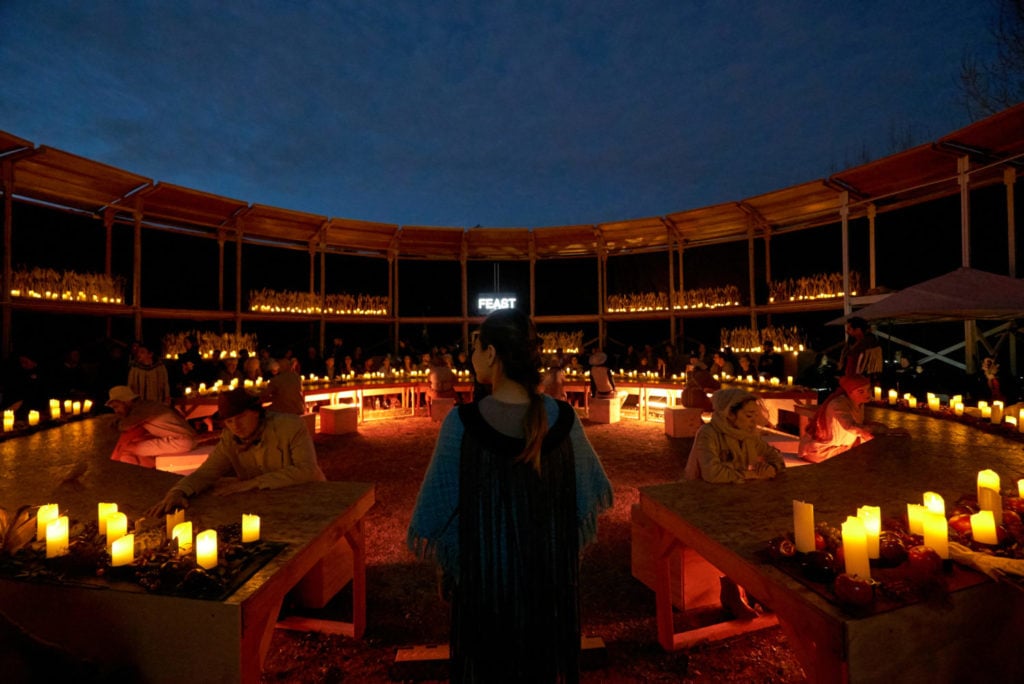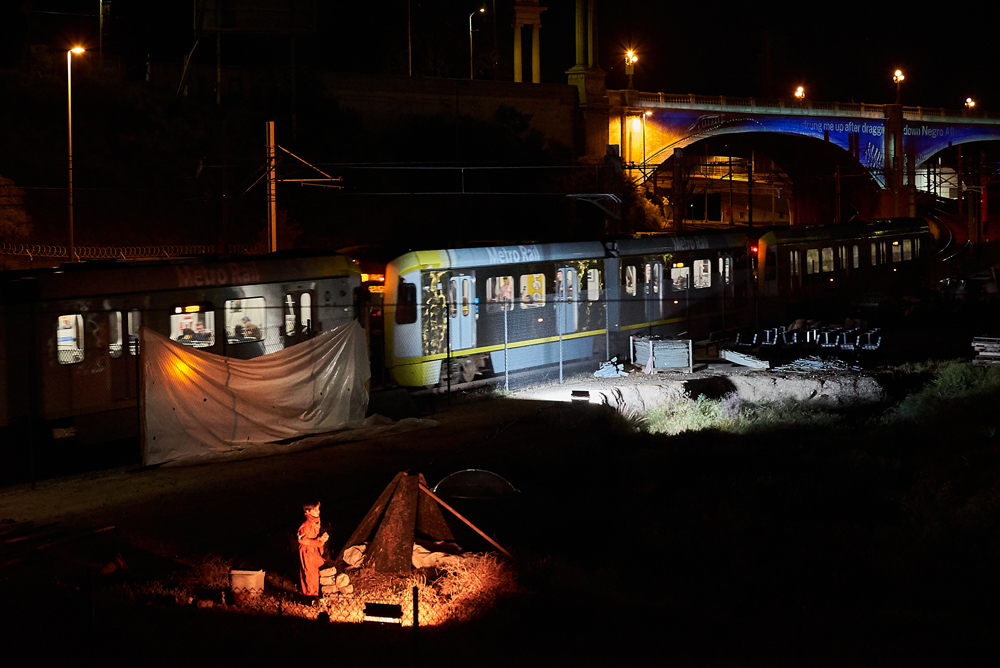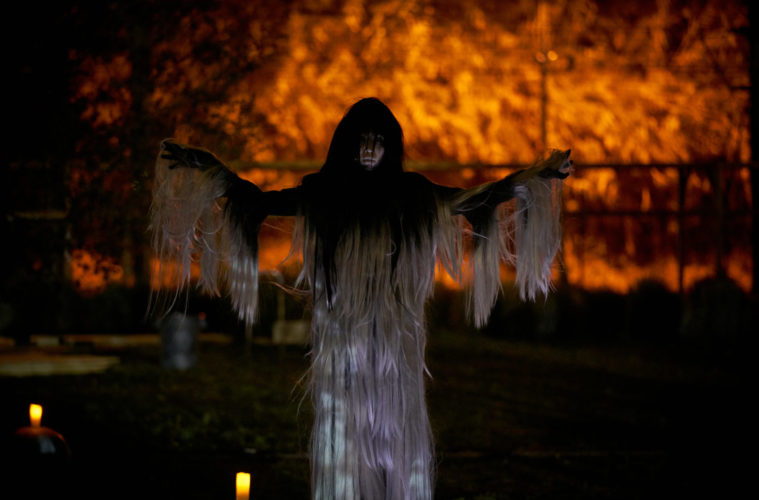The story of how the West was won is so shocking, violent and sad that it defies dramatic credibility. The conquest of America and the attempted destruction of so many disparate indigenous cultures remains this nation’s original sin, and involves a seemingly endless litany of heartbreaks, betrayals, broken promises and treaties, slavery, poverty, rape, suicide and murder that also extends to the non-white immigrants who came here, both willingly and forced.
To fully confront the systemic horrors of such a prolonged and ongoing genocide — spanning centuries — of Native and other people by European invaders requires abandoning almost everything you might have learned in U.S. history classes and recognizing, like Alice in Wonderland, that down is up and everything is backward in this country.
The Industry’s Sweet Land confronts this tragic history boldly in an astonishing presentation that unfolds like a chillingly beautiful fever dream across several unusual settings spread out in Chinatown’s L.A. State Historic Park. Enigmatically described as “an opera that erases itself,” the multimedia work, which received its world premiere on Saturday evening, February 29, and continues through Sunday, March 22, was created by composers Raven Chacon and Du Yun and librettists Aja Couchois Duncan and Douglas Kearney and enacted by a virtual all-star cast of new-music adventurists.
Like this divided country, Sweet Land splits off in two directions, giving audience members the choice of following one of two different storylines and processions that wend their way through the park in the gloaming before coming together again at the end. The piece is so ambitious that it requires two directors, Native artist Cannupa Hanska Luger (who also designed the costumes) and The Industry’s artistic director, Yuval Sharon; a cast of 18 vocalists and actors; two small vocal ensembles; and two dozen orchestra musicians.
As the audience files in for the Saturday preview and gets seated in wooden bleachers overlooking a vacant lot on the northeastern edge of the park, percussionists Corey Fogel and Derek Tywoniuk stir up a low, jangling din of metallic sounds in front of a large screen made out of a semi-sheer white sheet. Fogel walks back and forth, scraping little wrenches against a metal bar to create a bell-like blur of noise; later, he suspends a chain of wrenches from his mouth and moves his head back and forth to make them clink together. More ambient percussion occurs when trains from the Metro Rail Gold Line go by occasionally on tracks just past the park’s fence.
Vocalist Carmina Escobar (looking garishly wild in a hybrid costume of furs, kneepads, robotic gloves and a kind of exoskeleton) and soprano Micaela Tobin (wrapped up in colorful Native blankets, a canine-shaped glove and a black Misfits T-shirt) emerge from the darkness and begin prowling around while occasionally launching triumphant, feral coyote cries and boasts. An undulating keening of intertwined voices builds like a prayer-like incantation as the silhouettes of other characters of the community walk joyously back and forth on the other side of the screen.
But the feeling of harmony changes along with the music when a group of European settler-refugees known as the Arrivals marches in from the opposite direction, chanting more quaintly structured songs about their blood-obsessed god, their voices overlapping and then drowning out the Host community’s singing. There is a feeling of mutual curiosity as the two groups encounter each other. They intermingle and break off into two directions, leading each half of the audience to follow them on a short promenade to one of two settings: Train and Feast.
On Saturday, the Feast path led to a large, round wooden yurt-like building with an open-air ceiling framing the bare branches of a tree outside. The audience and the Arrivals assemble at benches and candlelit tables arranged in a circle as a small string section scratches together woozy, unsettling lines for conductor Jenny Wong. The Hosts feed the desperate refugees, whose mournful voices murmur together hypnotically in a section composed by Du Yun with a libretto by Duncan.

Photo by Casey Kringlen for The Industry
But the Arrivals turn out to be ungrateful and demanding, and the boorish Jimmy Gin (portrayed by falsetto-voiced countertenor Scott Belluz) tries to force Makwa (soprano Kelci Hahn) to be his wife, although he is eventually driven away by the Hosts. After the feast ends, the audience is taken outside to a nearby field called the Crossroads, where animated images of horses and deer are projected onto the shimmering sides of water formed by a row of sprinklers in the moonlight. The coyote singers are joined by Wiindigo (voice artist Sharon Chohi Kim), a fearsome, white-faced, wraithlike being draped in a furry, Yeti-like costume with oversize jaws and teeth sticking out of the back of her neck. Escobar’s lyrical coyote cries and Tobin’s wordless wailing (composed by Chacon and Du Yun with improvisations by the three soloists) come out as an engrossing series of gasps, shudders and laughter against an ominous electronic drone while Kim croaks scary guttural sounds.
The audience returns to the round building for a second Feast, where the white-hooded Arrivals sit at tables with empty plates while brandishing their forks and knives demandingly, as the small ensemble unspools creepy string parts bumped against restrained, fuzzy crumbles of electric guitar. Makwa is wrapped up like a cocoon in a shiny silver blanket on the center table, and, when she stands up in a daze, she finds herself being married against her will to the leering Jimmy Gin in a bizarre ceremony.
“An appetite can bite right back when the gut outgrows the spirit,” Tobin sings accusingly to the Arrivals, with lyrics written by Kearney. “Your skin reeked of drowning,” Hahn sings as Makwa recalls how needy the settlers were when they first arrived. “What happened to the land? It’s like a bone bleached by the sun.”

Photo by Casey Kringlen for The Industry
Gin and Makwa’s marriage symbolizes that the Arrivals have taken over the country, which they have renamed Sweet Land. The cast and audience, from both the Feast and Train storylines, walk back to the bleachers where the story began. A solitary figure named Speck (played alternately by Micah Angelo Luna and Leander Rajan) appears in the dark vacant lot beyond the park fence. At first, it’s not clear if the person is digging a grave, building an altar or making camp for the night.
Unseen soloists (singing from a nearby location) lament about how Sweet Land was built on the bones of innocent people, and horrifying stories about the deaths of Chinese railroad workers and abuse against African-Americans mingle with accounts of Native women being sterilized in white hospitals. Meanwhile, a choir intones warm vocal accents from under the bleachers. Supertitles with these memories suddenly appear on the front of a billboard across the train tracks and, even more stunningly a few minutes later, played out against the long side of the North Spring Street Viaduct, the imposing bridge that crosses the Los Angeles River just north of the park. (The sight must puzzle train passengers and other passersby in the area.) Seeing those heart-wrenching words projected starkly against such mundane backgrounds is as visually startling as the weave of voices — by soloists Nandani Sinha, Molly Pease and Joanna Ceja — is sonically mesmerizing.
One voice ruefully confides that survival in Sweet Land is all about “who gets to make citizens and who gets to make babies,” in the ending section, “Echoes & Expulsions,” which was composed by Chacon and Du Yun with a libretto by Duncan and Kearney. A piercing final voice cleaves the night air with a majestic and poignant final aria, punctuated by howls from the two coyote women, as the opera — and the story of America itself — winds down delicately into a powerfully moving silence.
Because Sweet Land involves two separate plots, it’s worth going a second time to catch the other storyline. At the late performance on Sunday, March 1, half the crowd took a ride on the Train track, entering another circular wooden structure with no ceiling. Guided by conductor Marc Lowenstein, the musicians in the first of the two Train scenes were ensconced inside a gazebo, and they emitted a disturbing, muted soundtrack of low strings and electric guitar. Panels inside the curving walls were pulled along a track, closing and opening again like shutters to reveal vignettes from such characters as the Preacher (baritone Richard Hodges) and his dutiful scribe (played alternately by Peabody Southwell and Molly Pease) and Rifle (Joanna Ceja) with music by Chacon and lyrics by Kearney. (If possible, try to get a seat in one of the swivel chairs up front, which makes it easier to quickly spin around as vocalists suddenly appear from behind panels at different places within the circular walls.)
Regardless of which track is chosen, Sweet Land lingers in the memory with its utterly entrancing music and inventive visual presentation. In relating such a bitter history of this country, the composers and librettists could have indulged in melodramatic sentimentality or used generic musical tropes. Instead, they experimented with unusual sounds and melodies to unlock the dark secrets still lurking in America’s collective attic.
L.A. State Historic Park, 1724 Baker St., Chinatown; Fri.-Sat., March 6-7, 6:30 p.m. & 8 p.m.; Sun., March 8, 7 p.m. & 9 p.m.; Fri.-Sun., March 13-15, 7 p.m. & 9 p.m.; Fri.-Sun., March 20-22, 7 p.m. & 9 p.m.; $25-$250. (213) 761-8598, sweetlandopera.com.
Advertising disclosure: We may receive compensation for some of the links in our stories. Thank you for supporting LA Weekly and our advertisers.

